#Story Arcs
Explore tagged Tumblr posts
Note
I find it really ironic that around the beginning of season 10, NR was praising Angela, saying she was the best showrunner of TWD. I heard it with my own ears.
I think his opinion has changes with the Leah thing. And there is another irony, bc DZ did much worse thing with Izabela and NR seemd suddenly OK with that. And yet another irony, if NR hadn't interfered with Leah thing in season 11, it would have turned out being a really good arc, we would have had original Caryl show, the spinoff would have been a success and NR wouldn't have had to worrying over his job as he should worried now after he allowed DZ to destroy the show. AMAZING.
Norman didn't like the character or the actor, but he also doesn't have any kind of story instincts. Every single one of his 'OoOoo, let's do this...' either gives me second hand embarrassment (like the suspenders) or an impending sense of doom, like when he claimed that 17-year old Beth, who was traumatized after her father was beheaded, was an adult woman. For the show to be successful, he shouldn't be given any real creative control. The decision to hire Zabel should be proof enough of that.
Leah was supposed to be the catalyst for Caryl and also the tie-in for the explanation to Daryl's facial scar. She was a pivotal character in telling Caryl's story (and I don't mean as a mid-ship. Ezekiel didn't really matter for that arc, Henry did). A good story arc needs to build organically and Leah as the catalyst for canon Caryl started all the way back in S9's "Stradivarius," long before her appearance in "Find Me." Like you said, it would've turned into a rewarding arc, if there hadn't been so much interference in S11 from multiple people with poor story instincts.
16 notes
·
View notes
Text
good morning plebeians!
there’s a heat wave right now. why does my bike only get fixed during heat waves? anyways, HI! HELLO. HOW ARE YOU?
i had a weird dream last night, but i don’t remember most of it. all i remember was my kids having absolute MELTDOWNS over the new season of squid game (i still need to finish it) which they should’ve been too young to watch so idk why these 7-9 year olds were watching this show hehhh???
i’m on part three of gotn omg omg omg. the structure of my books always fascinates me because evan’s series consistently follows the traditional story arc, whereas tov and sai don’t.
lemme explain (since it’s not a good morning plebeian post if i don’t yap at you).
the traditional story arc has the intro, the inciting incident, the rise/journey, the climax, and the deescalation/resolution before the conclusion/ending where everything returns to normal, but never the same.
i haven’t been in an english class in over five years so if i got the names of each segment wrong… fight me. 👾
anyways, the point is, neither tov nor sai follows that structure very cleanly. and that’s because those two books are volumes of each other. tov the EPIC did, yes. or a bit more. because original, tov was supposed to be published as one massive book (a girlie pop was delusional, we forgive her).
so if you look at tov and sai separately, then each stage of the story can be segmented into the following:
—
ToV:
intro: hilbert’s return to soilaila
inciting incident: the mob, alan’s intervention, and hilbert taking alan as a student
the rising action: alan learning magic, meeting the others, their attempts to intervene and steer alan away from hilbert
the climax: caramel’s labour healer thing and alan’s spiral mental breakdown?
descending action: alan seeking out info on what jomerazes are
conclusion: [can’t spoil lmao]
—
SaI:
intro: one year later intro to alan’s new relationship with… that one.
inciting incident: the festival of magic and the scouring of mind (YIKES)
rising action: the fallout of the FoM
climax: the second incident
descending action: the entire obsidian city scenes
resolution: [can’t spoiler again] + the reveal of the book + the epilogue
—
see how the book almost splits the arcs in half?
tov’s start is more resolute, but when it comes to the climax, it’s kinda not really a massive and clear cut climax, because the ACTUAL climax is in sai. same with sai. the starting feels less like an intro and more like you immediately picked up from the last chapter of tov. it feels like a next chapter rather than a next book.
compare that to cos and gotn.
i can list EVERY SINGLE SEGMENT, and actively FEEL when the climax is here, because the stakes are raised so high, and the resolution is FOR ME. ME. I NEED THAT FREAKIN RESOLUTION TO LET ME DOWN EASY. the ending feels complete, but also on a cliffhanger, whereas the ending for tov makes you think, where tf is the next chapter?
ye know?
anyways. i have work now. bye bye!
happy writing!
#thecomfywriter rambles#good morning plebeians#thecomfywriter#writing community#writing#writers#writers on tumblr#writerblr#wip#writers blog#writblr#gotn#tcw wips#sai#scarlet and ice#tov#throne of vengeance#writeblr#story arcs#tcw rambles
7 notes
·
View notes
Text
Writing: Things I Learnt The Hardway #17
~Villians and Conflicts~
This isn’t a RULE but it did help me with my book so listen up.
Your antagonist (bad guy) should be in opposition to your protagonist’s (main character) goals. Not just a mean or even an evil person, this character should be what stands directly in your MC’s way. If you’re struggling to find a conflict under all that worldbuilding and character development, tie a person to a problem. Not just “I need to escape this cult.’ Try ‘I need to escape the leader of this cult who just so happens to also be my mother...” For example ;)
This sounds like Writing 101 but it can be easy to lose interest when your MC isn’t anyone’s target in particular. Environmental and situational conflicts are valid, but they run dry faster and can turn into plot-convenient obstacles that pop up randomly. A villain that knows the protagonist’s goals keeps the fight proactive and intentional more than just being difficult.
Anyway my book about a boy escaping his mother’s cult coming out October 4th. Check it out > @statusquoofficial
#my writing tips#small author#ao3 author#debut author#indie author#aspiring author#new author#authors of tumblr#new writer boost#new writeblr#new writers corner#new writers society#new writers on tumblr#new adult books#new writing blog#new books#female protagonist#antagonist#villian oc#character arcs#orginal character#character building#original characters#character development#character illustration#original character#story arcs#original story#story writing#writer problems
10 notes
·
View notes
Text
youtube
How To Write Any Story - Why Pacing Is Everything
The Second Story 1 Sept 2024
Should you avoid formulas when writing a story? In this video I talk about why I think you should avoid formulas and what you should do instead to construct a good plot.
9 notes
·
View notes
Text
I’ve been seeing some interesting opinions lately so i’ve decided to come to tumblr to see the mass opinions!
(lumping some of these together because some of these are like 2chs/don’t add a lot because it’s early)
I’d also would like to know why you didn’t like the arc, i’m curious what the masses think.
15 notes
·
View notes
Text
I dismiss the notion that it’s bad writing that Caitlyn isn’t punished enough by the narrative.
Narratives and storytelling is more than just objective facts strung together in a sequence. Character arcs are more than just if they get a comeuppance or a reward in the end. Some stories do not end nice and tidy in a neat little bow.
If your concept of “good writing” begins and ends with requiring characters be adequately punished for their crimes, you don’t know anything about writing or storytelling and you’re letting puritanical beliefs cloud your judgement.
#arcane#arcane season 2#narrative foils#narrative structure#writing#writing 101#story arcs#character arcs#media literacy
9 notes
·
View notes
Text
My rankings of one piece arcs + reasons (canon and not including egghead as it’s still ongoing):
1. Marineford (Luffy trying to save ace? ACE IN GENERAL. WHITEBEARD AND HIS CREW <3333 the asl story. Garps internal fight as to betray the marines to save his grandson or leave him as is because he chose to become a pirate knowing the consequences. Conquerors haki from luffy yes please)
2. Wano (Gear 5 + the whole plot of wano. Hiyori and Yamato<3 KidLawLu alliance. Joyboy mentions. Yamato and ace?!! Ace and O-Tama then luffy practically adopting otama and momo. Zoro and Toko i’m gna cry this is literally my second fav arc i cant. even more lore drops the story of oden and the roger pirates and the whitebeard pirates)
3. Water 7 + Enies Lobby (Franky and the story behind the sea train and Tom. The fight for robin and the story of Ohara)
4. Sabaody Archipelago (First appearances with the supernovas and the celestial dragons getting their shit rocked)
5. Alabasta (I just connected with the whole middle eastern vibe of it all and crocodile and GREASY ACE?! Bon clay the goat)
6. Skypeia (The lore drops in this omg and the bell? i love)
7. Return to Sabaody Archipelago (Funniest arc i loved the fake straw hats and luffy flexing his haki against the pacifistas and everyone’s new appearances <3)
8. Dressrosa + Zou (Voice of all things with Luffy and Momonosuke and RAIZO IS SAFE oh my lord and then dressrosa as a whole, laws backstory and corasan and doffy and the appearance of sabo and then the whole straw hat grand fleet apart from the fighting bc it dragged and trebol turned me off my life i think this arc could rank higher but idk rn)
9. Punk hazard (Smokers new appearance MEOWWWW and saving the kids and ceaser clown)
10. East Blue saga (Cute and we get to see the dynamics of the crew for the first time)
11. Little Garden + Drum (Little garden was meh for me but dorry and broggy and ussopp bond yes please and choppers story made me ugly cry)
12. Impel Down (Funny but dragged)
13. Amazon Lily (Kind of dragged but i love the scene where luffy covers Sandersonias (?) back bc he knew they didn’t want anyone to see)
14. Jaya (Kind of hate but the appearance of blackbeard scared me straight out)
15. Fishman Island (Poseidon and joyboys apology and again the voice of all things + luffys haki knocking out almost half of his opps i loved. but sanji genuinely pissed me off in this arc like i love him but omg?)
16. Reverie (didn’t know it was a mixed filler arc so it kind of dragged but i loved all of the people luffy saved interacting)
17. Whole cake island (DRAGGRD DRAGGRD THE FIGHT WITH LUFFY AND KATAKURI SURE WAS GOOD BUT IT DOESNT EXCUSE 15 EPISODES OF FIGHTING. Plus big mom pissed me off but sanji backstory made me cry again)
18. Thriller bark (Worst arc i’ve ever watched literally had it as background noise as i went on my phone the only good thing was that NOTHING happened and brook and laboon)
#one piece#anime#story arcs#one piece anime#wano arc#marineford#portgas d ace#one piece sabo#monkey d. luffy#straw hat pirates
14 notes
·
View notes
Text

— "Story Arcs"
#spilled ink#original poems#poets on tumblr#writing#poetry#elyhse poetry#poem#Story Arcs#creative writing#love#writing community
2 notes
·
View notes
Text
I gave Amigo from Samba de Amigo a super form
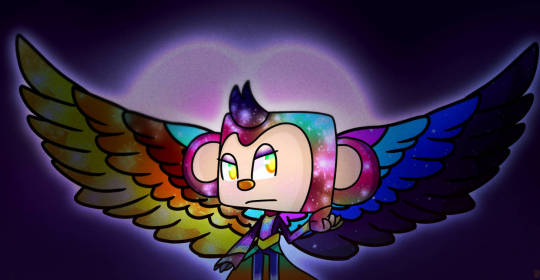
It’s called Alibreje Amigo. Based on the Mexican spirit guides.
I invisioned a story mode game for Samba De Amigo, he is sent to the land of the dead after contracting with a shard of a magic crystal and needs to find the other five shards to gain this super form in order to save his home from a dangerous bad guy who is set to kill everyone in his home.
Amigo learns the importance of being remembered, as he met a sugar skull who becomes forgotten, he knows that memories need to be shared down to people who knew the loved ones in life.
the bad guy is defeated and dies, and Amigo erases everyone’s memories of him.
4 notes
·
View notes
Text
「 ✦ Lore & Arc's ✦ 」

┏━━•❅•°•❈•°•❅•━━┓
Lore
Reyna Rossel
More coming soon...
Arc's
Memories Recom.
More coming soon...
Au's
Love Switch
More coming soon...
┗━━•❅•°•❈•°•❅•━━┛
#codename kids next door#kids next door#knd#codename knd#codename: kids next door#knd oc#oc#code name kids next door#codenamekidsnextdoor#codenamekidsnextdooroc#codenameknd#kidsnextdoor#masterpost#masterlist#oc lore#lore#reyna a. rossel#numbuh infinity-s#sherryl rossel#Jonathan coleston#damaris caddel#dakarri caddel#knd au#character arcs#redemption arcs#story arcs#original character#knd ocs#oc x canon#my oc
10 notes
·
View notes
Note
What is your favourite season and/or episode of twd? Are your professional opinion and personal preference the same? :)
Working in the industry has influenced how I watch a show, so I suspect my emotional response doesn’t venture too far from my professional one, but I haven’t really put any thought into the difference until now. So, we’ll see how they match up 🤓 For professional reasons, I’m kind of an omnivore—I’ll at least try to watch any show. Good writing (along with acting and directing) can make a tired concept shine and a poorly executed but original premise is worth a look-see. For one, I want to know what’s being produced and two, it’s good to analyze what went wrong and why.
Anyway. (That’s not what you asked about.) Back to TWD.
S1 has sound structure, which sounds boring, I know, but a screenplay depends on its frame. You can write a novel by the seat of your pants or by only knowing how it’ll end. You can discover the middle as you go along. A screenplay becomes a hot mess if you do that, so I appreciate that Darabont knows how to introduce characters and how to get from point A to point B. It’s readily apparent that he’s a feature director in how the story looks and feels. That said, I don’t connect, exactly, in the way he wanted his viewers to relate to the characters. After the pilot, I was much more interested in Morgan than Rick. I found the dynamic by the second fire at the quarry camp, when Shane asked Ed to keep the flame smaller, with Carol’s response to his greeting and how she had to jump up to remove the firewood, more compelling than the love triangle between Rick, Shane and Lori.
S2 is gorgeous. Very cinematic feel where shots linger on the little details, setting the right ambiance for the narrative. We get some commentary (offhand, but still) on the problematic issues, such as race and gender roles, which unfortunately are compounded and reinforced without self-reflection in latter seasons. (S3 has so many issues in this regard, along with the inability to focus on the core group.) S2 also adheres to classic horror tropes. The simplicity of its contained setting: the farm, the looming presence of the barn, the woods beyond, the abandoned town and creepy bar. Beth taking to bed, wanting to end it all is straightforward Southern Gothic. Carol, Andrea and Lori are all shaded, at turns, as the madwoman in the attic. Daryl is thrown from a horse, falling down the cliffside and talking to ‘ghosts.’ It's a very atmospheric season, faithful to the horror genre.
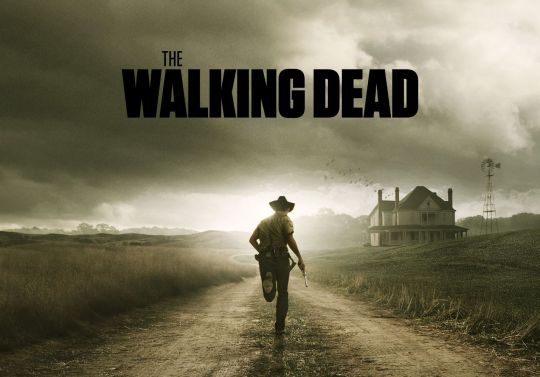
It does have pacing problems, but not as pronounced as the Gimple era with its time jumps and bottle episodes, which completely kill the momentum. There’s nothing wrong with the odd bottle episode (if you have enough time to explore an emotional arc more in-depth) but reliance on a ‘TV book of tricks’ usually means the showrunner doesn’t know how to plot a tight narrative and is trying to hide those deficiencies by confusing and distracting the viewers. The logic being, if the audience is trying to work out how the hockey sticks it all fits together, chances are they won’t notice plot holes or how flimsy/implausible it all is. It’s storytelling by manipulation.
S2 doesn’t do any of that, but it’s slow. Too slow for TV and for 10 episodes. At times, it feels like an art house movie and at other points, like we’re standing still, treading water. Whereas S1 was structured like an extended feature film, a 10-episode season is much too long for that. You end up with a sagging second act by imposing a large 3-act structure on something that should’ve been plotted by character arcs and micro missions.
TV writing is much more complex than a feature script because you have a larger main cast who all have their individual arcs that run over multiple episodes/seasons. The story engine of a TV show is also not equal to the central problem of a movie script. The former has to keep the show going for several seasons and each character has their own relationship to it, while the latter pertains to the hero only and has to be of a scope that can be solved in a 2-hour feature. (That got very technical, please don’t fall asleep 😬)
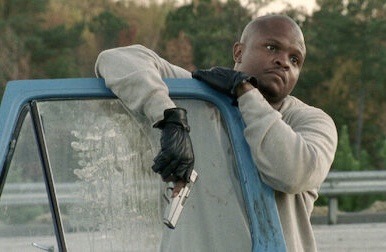
I wanted T-Dog to have a character arc in season 2. He’s the only S1 character who got none at all.
Over all, S10 is my favorite season. Yes, the cast is bloated at this point, but the narrative is centered on Michonne and Carol’s grief driven arcs, and Daryl comes into his own. He’s not a traditional leading man, but this season shows that he is so much more than the henchman of the hero. S10 is subtle and there’s great attention to detail in the writing. All the callbacks to previous seasons couldn’t have been done if the showrunner didn’t have thorough knowledge of the show in its entirety and a solid understanding of the characters’ emotional truths.

From a personal perspective, I like Kang’s use of comedic elements to heighten the drama. It affords the actors a different kind of challenge and after more than a decade as the same character, actors need that. (There’s only so many variations of a pretty cry.) Kang’s natural inclination veers more toward dramedy, but she’s also writing to the strength of her leads. Comedy is demanding for actors and requires a different skillset from drama.
Case in point, 1021 “Diverged.” I love the episode because of its comedic tone: it’s far removed from how we’ve ever seen Carol before, but she’s still in character. The poignancy of her sadness and her fears regarding herself and her relationship with Daryl is amplified by her attempt to entice a rat by waving a lettuce leaf in the air and chit-chatting with walkers as she casually stabs them in the head. It’s a bottle episode that trusts the actors—giving them the space to explore their characters’ emotional state—because so much of the action depends on physicality. The relative sparseness of dialogue might appear to be mundane, yet it reveals so much. Not only about Caryl’s relationship with each other, but the evolution of Jerry’s friendship with Ezekiel as he takes his first few steps away from being simply the wingman. And, most of the plot points are conveyed in tone and subtext rather than actual words.
It gets a little murky, when talking about individual episodes, to distill those down to ‘favorites,’ because what I like is often how something connects to a bigger arc. Sometimes, it’s the unrealized potential that grabs me. There’s a number of those in the middle seasons. I find Lizzie’s arc and how her trauma intersects with Carol’s fascinating, but the connective tissue is lacking. The way Beth and Carol fit into each other’s arcs was compelling, but completely lost because of a ridiculous offscreen insistence on framing a teenager as a viable love interest to a middle-aged man. I liked the interplay between Lennie and Melissa, but the way their characters were positioned as frenemies felt clunky and artificial and it ignored most of their backstories.
To answer your second question, I appreciate S1 in a more clinical, detached way and S2 resonates on an emotional level from its exploration of the human condition. S10 is where things meet for me. The viewers are expected to think for themselves, it’s not leading us by the nose. There’s enough emotional depth to dig in and I love the genre blending that’s a feature throughout the season. It does have its share of problems, too. For example, I didn’t like how Michonne’s exit was framed and the idea of Leah was introduced too late (or maybe too early) because of the way her storyline interlocks with the origin story of Daryl’s scar.
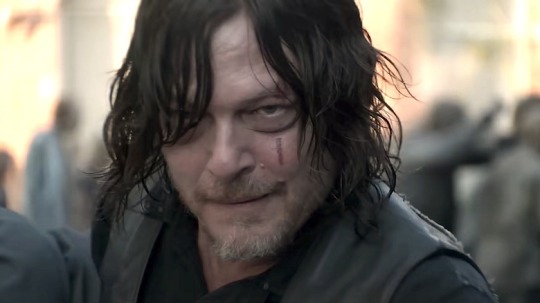
You don’t modify a character’s appearance in a way that costs money and requires more time in make-up for no reason.
Thank you for the ask! It’s different from the ones I usually get, so it was a nice change of pace.
7 notes
·
View notes
Text
Psycho-Pass: Mindscape
Premise: In a dystopian future where mental states and potential for criminal activity are constantly monitored, society is governed by the Sibyl System, a mechanism that uses psychological profiling to determine people's "Crime Coefficients." The system categorizes citizens based on the likelihood of them committing crimes, creating a tense atmosphere where law enforcement officers, called Inspectors, ensure public order. However, the system starts malfunctioning as it begins misinterpreting complex psychological conditions, causing it to label people unfairly and punish them unjustly. The story follows an elite team of investigators who uncover the dark reality behind the Sibyl System and its manipulation of psychological data. They realize that the system's reliance on strict categorizations—based on psychology—doesn't account for the complexities of human minds.
Key Psychological Elements:
Psychopathy and the Dark Triad:
Main Villain: A character with traits of the Dark Triad (Narcissism, Machiavellianism, and Psychopathy). This character uses the system's reliance on personality traits to manipulate others.
Psychopaths: The show would delve deeply into the psychology of psychopaths, examining how their reduced empathy and manipulative behavior might make them more difficult to read for the Sibyl System, which relies on detecting empathy levels.
Cognitive Dissonance: The protagonists experience cognitive dissonance, struggling with the tension between their loyalty to the law and the growing awareness that the Sibyl System is flawed and unjust. Characters might have conflicting feelings about their roles, ultimately making them question their morality and the nature of justice.
Attachment Theory: Characters' relationships would reflect the dynamics of attachment theory. For example, some Inspectors might develop anxious attachment styles due to early childhood trauma, while others might exhibit avoidant behavior, making teamwork and trust-building difficult.
Characters could struggle with their desire for connection versus the dehumanizing nature of their work.
Psychological Profiling & the “Big Five” Personality Traits: The series could incorporate the Big Five personality traits (openness, conscientiousness, extraversion, agreeableness, and neuroticism) to show how different types of people are classified. The Sibyl System would try to quantify these traits but would struggle to account for the complexities of human behavior.
Protagonists might debate how the system reduces people to numbers and labels, creating tension with their moral compass.
Moral and Ethical Philosophy: Characters grapple with philosophical dilemmas: is it right to sacrifice an individual for the greater good? The series would explore utilitarianism, deontology, and the trolley problem, often showing the tension between following orders and doing what feels morally right.
Social Psychology – Group Dynamics:
The psychological tension between the Inspectors and Enforcers is based on group dynamics, where power structures, hierarchy, and group cohesion impact decision-making. Inspectors, though technically superior, must rely on Enforcers—often criminals—to execute their plans. The difference in social status between these roles often sparks conflict, providing rich material for psychological exploration.
Mental Health Disorders: Some characters would be diagnosed with specific mental health disorders, reflecting the real-life complexities of disorders like depression, bipolar disorder, schizophrenia, or borderline personality disorder. The narrative could explore the stigma surrounding mental health and how the Sibyl System might miscategorize individuals based on these conditions.
Confirmation Bias & Cognitive Biases: As the protagonists investigate cases, they struggle with confirmation bias, seeking evidence that aligns with their preconceived notions of right and wrong. This bias could interfere with their decision-making process, affecting the integrity of their investigations and forcing them to question their own beliefs about justice.
The Role of Empathy and Altruism: The series could explore the power of empathy as a force for good and bad. Characters with higher empathy may become overly emotionally invested in cases, risking their objectivity, while others with lower empathy might make cold, calculated decisions.
The empathy-altruism hypothesis could also be explored—whether individuals act to help others out of genuine altruism or selfish motives.
The Fallibility of the Sibyl System (Artificial Intelligence and Ethics): The most critical element would be the ethical concerns about AI and psychological profiling. The show would explore the tension between technology and humanity—can an AI ever truly understand the complexities of human nature? What happens when it fails to consider nuances in behavior? The implications of AI-powered surveillance, predictive policing, and how these technologies impact free will and human rights would be thoroughly examined.
Main Characters: Inspector Hana Kuroda: A brilliant but emotionally detached detective who begins questioning the integrity of the Sibyl System. She struggles with cognitive dissonance as she uncovers systemic flaws and faces her own childhood trauma linked to attachment theory.
Enforcer Ryoji Takeda: A former criminal who has been "rehabilitated" by the system and now works alongside the Inspectors. He exhibits traits of psychopathy and Machiavellianism but is also conflicted about his loyalty to the law, leading to complex moral decisions.
Dr. Haruki Asano: A psychiatrist who works with the Sibyl System but begins to realize that the system's psychological evaluations are deeply flawed. He has a background in cognitive psychology and tries to argue that a person's potential for violence can't always be determined by their personality traits alone.
Akira Nishimura (Villain): A character whose personality disorder (e.g., narcissistic personality disorder) and highly strategic mind allow them to exploit the flaws in the Sibyl System. They manipulate the psychological evaluations, creating chaos in the system.
Mika Ueda: A young, idealistic Inspector who initially believes in the system but begins to experience empathy burnout as she witnesses the suffering caused by the misinterpretations of the Sibyl System.
Story Arcs:
Investigation Arc: The team investigates a series of seemingly random crimes, only to uncover a deeper conspiracy involving the manipulation of psychological profiles. The crimes reveal the flaws of the Sibyl System and highlight the complexity of human behavior.
Psychological Breakdown Arc: One of the central characters experiences a mental breakdown due to the pressure of their work, revealing the toll that constant surveillance and profiling can take on one's psyche. This arc would deal with the complexities of workplace mental health in high-stress environments.
Revolution Arc: A group of rogue scientists and ex-Inspectors challenge the Sibyl System by revealing how it misrepresents psychological profiles. They believe that psychological diversity is essential for society’s survival, and they begin a campaign to dismantle or reform the system.
Visual Style: The aesthetic would be sleek, minimalist, and technologically advanced, mirroring the cold efficiency of the Sibyl System. Flashbacks and psychological insights could be visualized through symbolic imagery or surreal dream sequences, showing how characters’ minds unravel.
2 notes
·
View notes
Text
Sadok: ( Sagittarius )
Titania: Reams Of NeoImmortals Astrological Gemstone Series ( Astrological Sagittarius ) ~ ~ ~ ~ Titania Book Title: Sadok Written Order: ( in the series ) – 6th Story Arcs Placement: ( written ) – 8th Story Entities: Centaurs / Fae / Air Elemental Fae / Minotaurs / Demoniacs / Lukkans /Woffians / Lycans / Lycanthropes / Prime Elemental Bio-Generated NeoImmortal /…
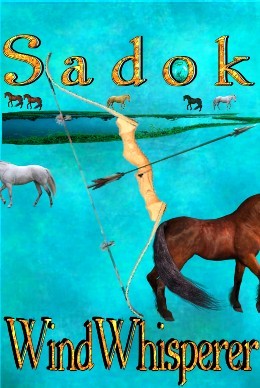
View On WordPress
3 notes
·
View notes
Text

shitty photo of a cool infographic
6 notes
·
View notes
Text
5 notes
·
View notes
Text
ok, i confess. i've been binge watching black mirror. and the writers are AMAZING. i pray that they're not written by ai. lol
the productions are great of course but the scripts and story lines have not disappointed me once.
i've actually intentionally averted watching any of black mirror episodes until now and in a weird way, i think i was right to age them.
should i have waited more like a couple more years? not sure. i'll revisit this blog in the future. for now, i'll just assume no and now is the right time to watch them.
6 notes
·
View notes